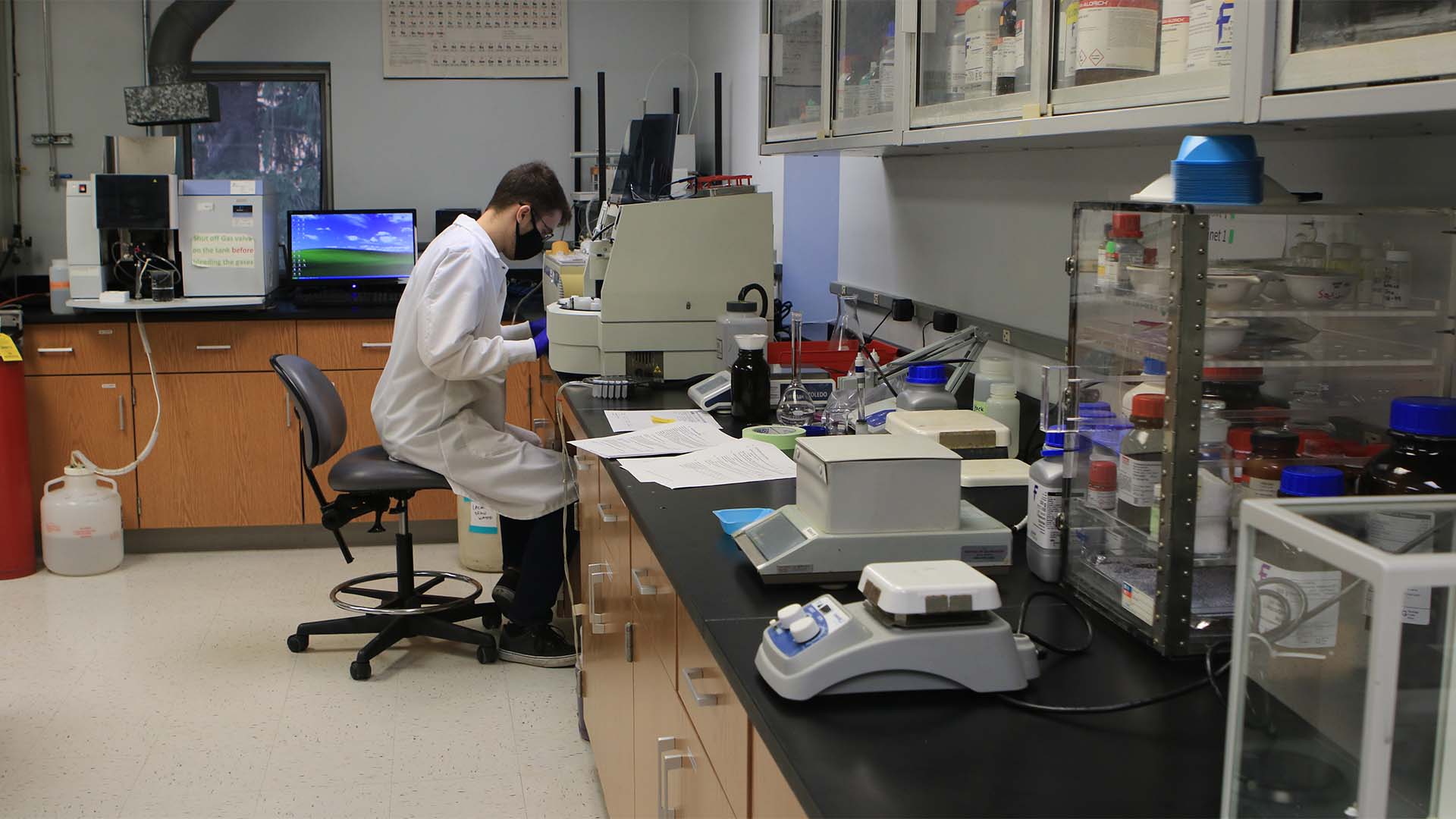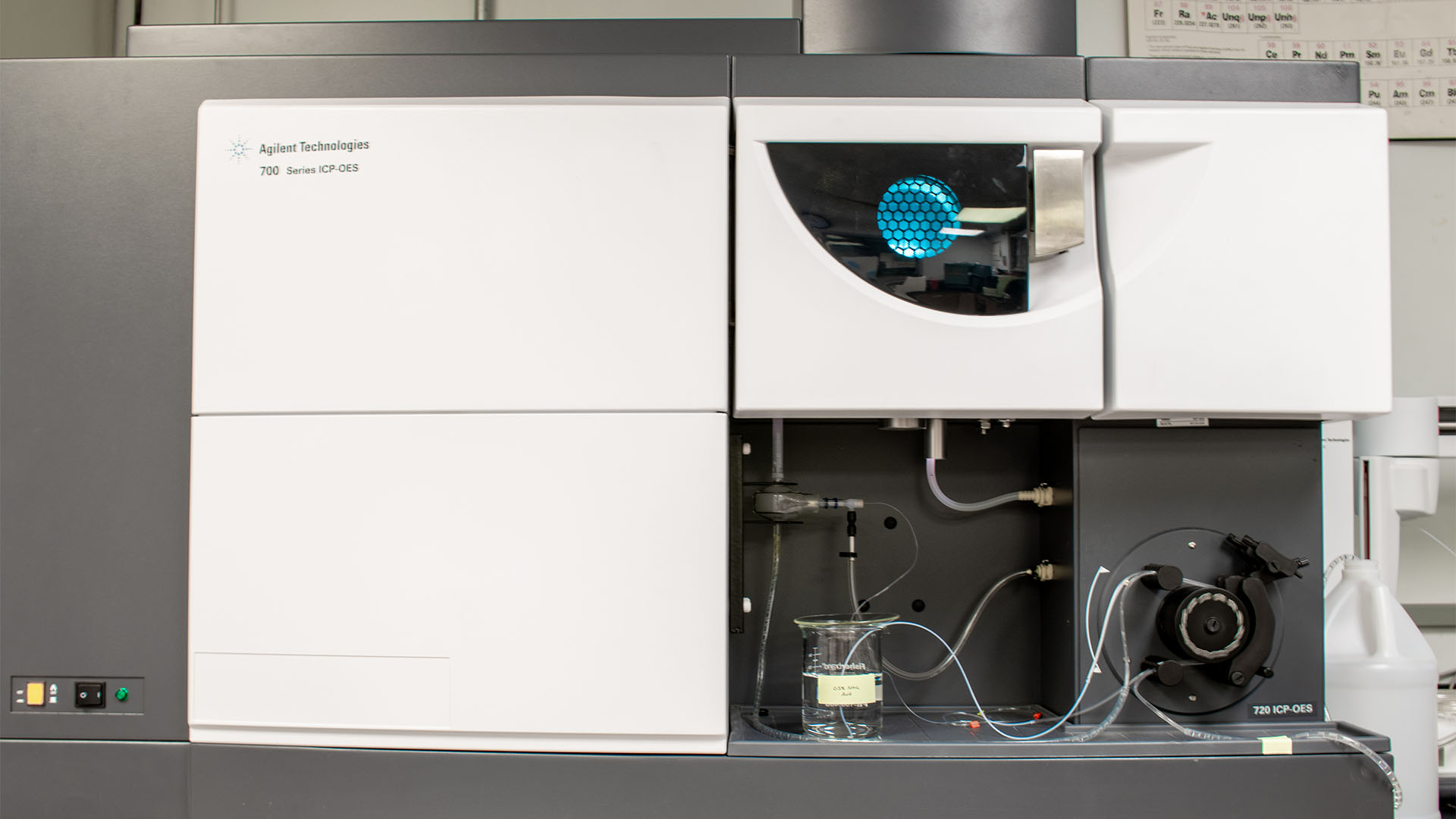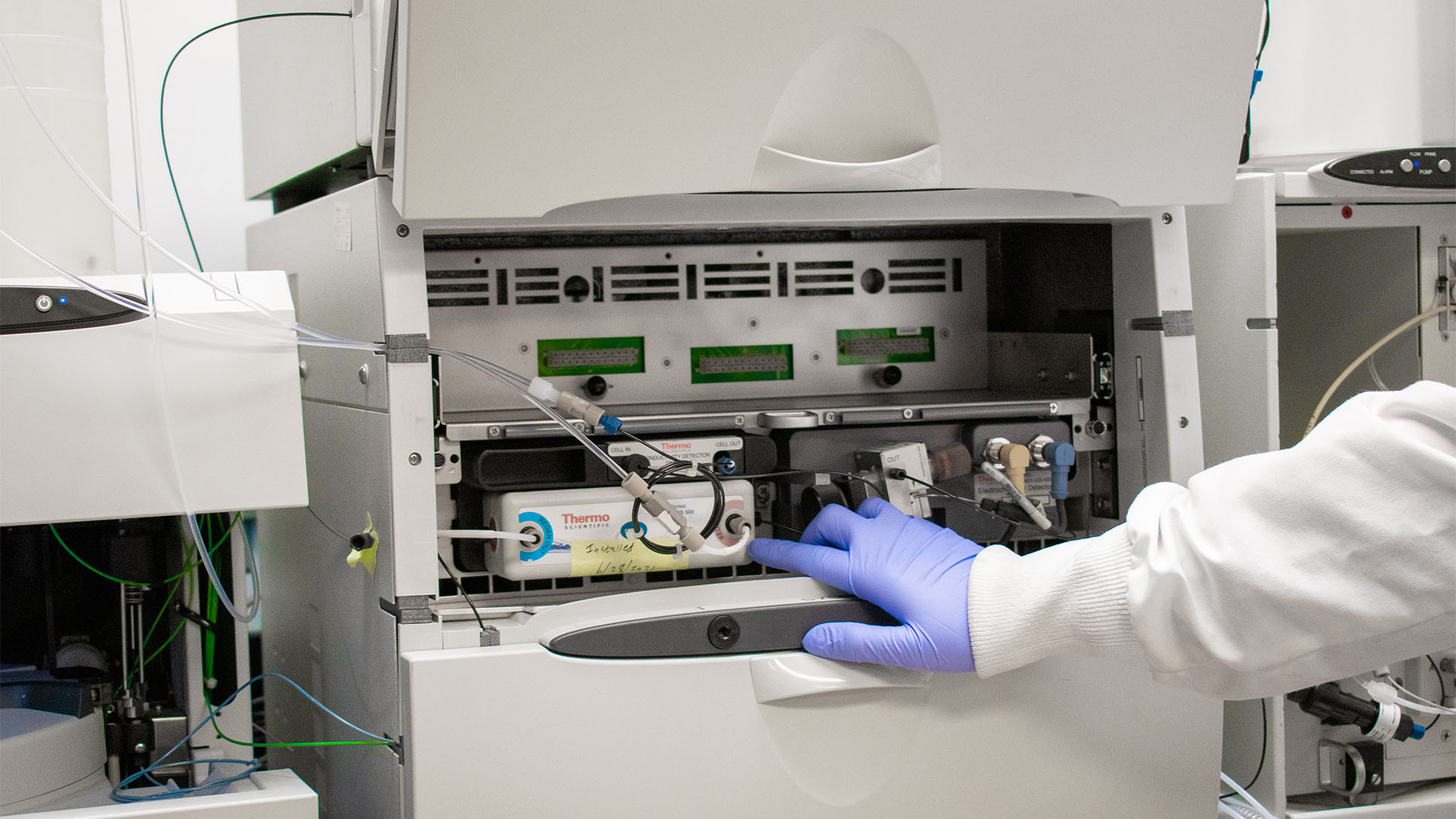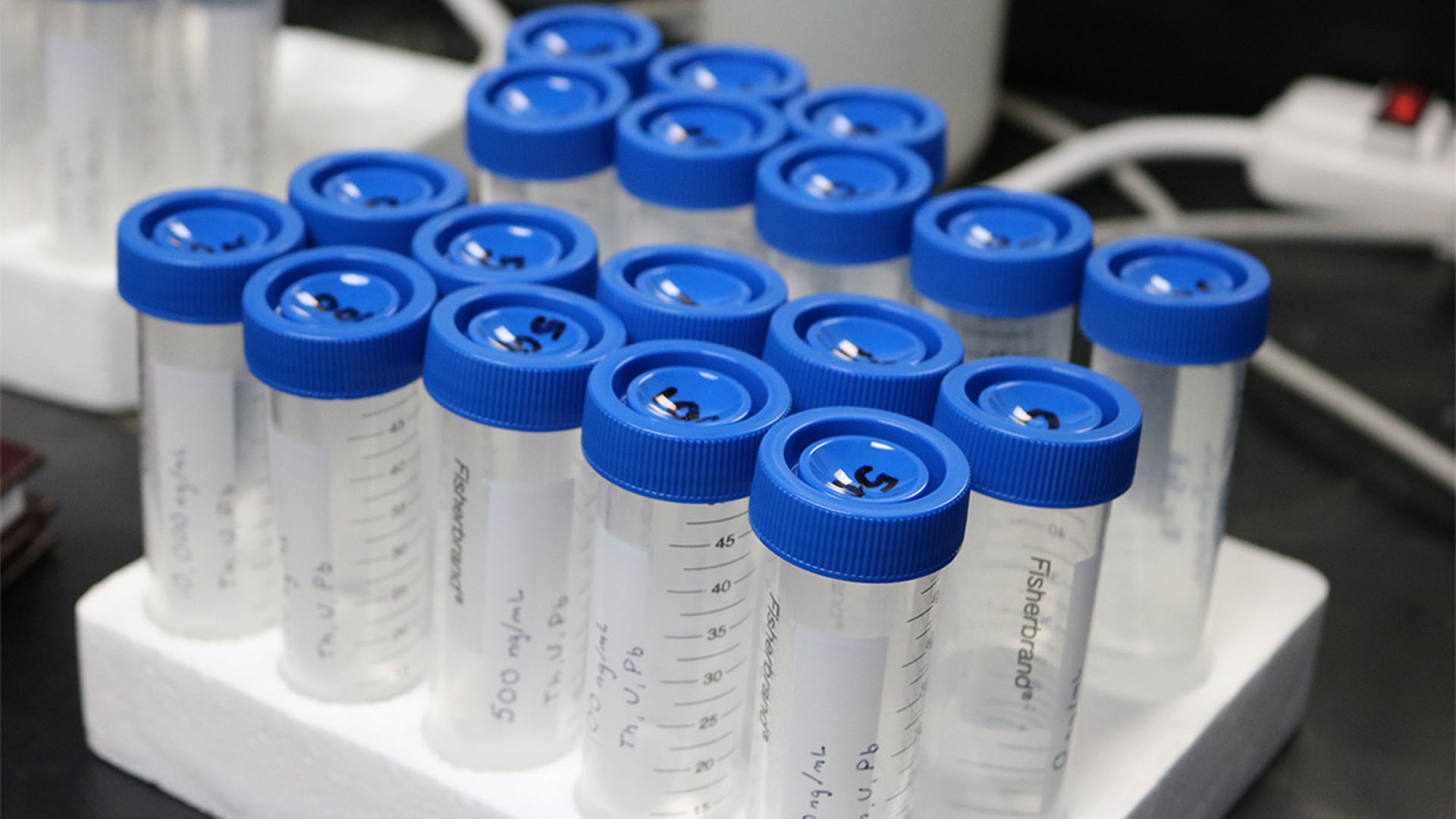New equipment brings new possibilities to the Water Sciences Lab
A The University of Nebraska’s Water Sciences Laboratory (WSL) has acquired important new equipment through the Federal Excess Personal Property Utilization Program. A Thermo ICS 5000+ Ion Chromatography System (ICS) and an Agilent 720 Inductively Coupled Plasma – Optical Emission Spectroscopy (ICP-OES) system have both been installed and will be used to expand methods and services available at the facility.
“The new equipment will be used mainly to support and test a variety of samples from research projects across all of the University of Nebraska campuses and will support water monitoring and soil and tissue testing by local agencies,” said Water Science Laboratory Director Dan Snow.
-

The Water Sciences Laboratory’s mission is to provide technology, expertise, services, and training in advanced analytical science supporting today’s water and natural resources students, researchers, and stakeholders. The Lab is part of the Nebraska Water Center. Photo credit: DWFI
-

The Water Sciences Laboratory’s mission is to provide technology, expertise, services, and training in advanced analytical science supporting today’s water and natural resources students, researchers, and stakeholders. The Lab is part of the Nebraska Water Center. Photo credit: DWFI
-

The Water Sciences Laboratory’s mission is to provide technology, expertise, services, and training in advanced analytical science supporting today’s water and natural resources students, researchers, and stakeholders. The Lab is part of the Nebraska Water Center. Photo credit: DWFI
-

The Water Sciences Laboratory’s mission is to provide technology, expertise, services, and training in advanced analytical science supporting today’s water and natural resources students, researchers, and stakeholders. The Lab is part of the Nebraska Water Center. Photo credit: DWFI
Specifically, the ICS is used for water chemistry analysis; it measures concentrations of major anions like fluoride, chloride and nitrate; and has automation and additional detectors that allow development of additional methods for water testing. For example, the lab recently optimized a method which allows for the measurement of chloride, chlorate, and chlorite in water and solid matrices. The new instrument replaces a system that was almost 20 years old. The ICS 5000+ has a gradient pump, an auto-diluter and multiple detectors, making it much more sophisticated and versatile and allowing for more rapid, automated, and sensitive analyses, as well as application of new methods.
The Agilent 720 ICP-OES replaces a 20-year-old Perkin Elmer atomic absorption (AA) spectrophotometer. The ICP-OES measures elemental concentrations by exciting elements through an argon gas-powered plasma torch. The energy emitted is measured by wavelengths that are characteristic of their respective elements. ICP-OES is used for rapid and highly sensitive measurement of metals and trace elements such as sodium, potassium, iron, copper, lead, and magnesium in water or soil samples. The ICP-OES comes with an autosampler and can scan and simultaneously measure over 30 elements for fast, low-cost detection at part per million levels in many samples.
Snow said these additions allow the lab to run more samples at a greatly reduced cost. The federal loan program provided permanent transfer of the equipment from a U.S. Food and Drug Administration (FDA) laboratory in St. Louis. The four-year-old equipment is valued at over $200,000.
The WSL is excited to start new research to help improve water and soil quality through its new equipment. Researchers, faculty, students and partners are encouraged to learn how the lab’s new and existing equipment can strengthen their research.
FY 2022 Annual Report
- Overview
- Letter from the Executive Director
-
Research and Policy
-
Nebraska + Regional
- DWFI offers suite of tools to improve irrigation water use and agricultural productivity
- Understanding groundwater markets and transfers in Nebraska
- Water management for improving water use, sustainability
- Research looks to control nitrate leaching, protect Nebraska groundwater
- DWFI researching solutions, fostering communication regarding AltEn environmental crisis in Mead, Nebraska
- Nitrate Strategy Groups release calls for action
- Mapping geographic heat inequities in urban areas
-
Global + National
- New report explores the business ecosystem for smallholder irrigation in Rwanda
- Visit to Nebraska results in water management partnership with Brazil
- New study shows economic impact of the irrigation equipment and services industry
- DWFI and Mammoth Water launch report of water market readiness
- USDA partnering with Nebraska Water Center to enhance modeling system
- Faculty Fellows
-
Supported Students
- Water for Food Research Forum showcases exciting student work
- DWFI welcomes new round of student support recipients
- Student's fertigation startup awarded first Husker Venture Fund investment
- Four DWFI supported students receive doctoral degrees
- Nebraska researchers are following the water
- Heeren Inspires Students through Irrigation Field Course
-
Nebraska + Regional
-
Communication, Education + Outreach
- DWFI reconnects with international partners and projects
- Nebraska Water Center seminars focus on hydro-tourism, economic development in Nebraska
- Nebraska Water Center conference held in Scottsbluff
- Virtual forum broadens institute’s reach
- Aquifer recharge project in Nebraska featured in international publication
- Digital growth: Water for Food Podcast and online engagement
- Development
-
Photo essays
- DWFI discusses water management with delegation from Kenya
- DWFI and Nebraska Water Center engage with attendees at UNL East Campus Discovery Days
- DWFI and Nebraska Water Center participate in UNL Sustainability Kickoff event
- DWFI hosts students Faculty Fellow for fall welcome event
- DWFI sponsors annual Earthstock event on University of Nebraska Lincoln campus
- Resources
- Search
FY 2022 Annual Report
- Overview
- Letter from the Executive Director
-
Research and Policy
-
Nebraska + Regional
- DWFI offers suite of tools to improve irrigation water use and agricultural productivity
- Understanding groundwater markets and transfers in Nebraska
- Water management for improving water use, sustainability
- Research looks to control nitrate leaching, protect Nebraska groundwater
- DWFI researching solutions, fostering communication regarding AltEn environmental crisis in Mead, Nebraska
- Nitrate Strategy Groups release calls for action
- Mapping geographic heat inequities in urban areas
-
Global + National
- New report explores the business ecosystem for smallholder irrigation in Rwanda
- Visit to Nebraska results in water management partnership with Brazil
- New study shows economic impact of the irrigation equipment and services industry
- DWFI and Mammoth Water launch report of water market readiness
- USDA partnering with Nebraska Water Center to enhance modeling system
- Faculty Fellows
-
Supported Students
- Water for Food Research Forum showcases exciting student work
- DWFI welcomes new round of student support recipients
- Student's fertigation startup awarded first Husker Venture Fund investment
- Four DWFI supported students receive doctoral degrees
- Nebraska researchers are following the water
- Heeren Inspires Students through Irrigation Field Course
-
Nebraska + Regional
-
Communication, Education + Outreach
- DWFI reconnects with international partners and projects
- Nebraska Water Center seminars focus on hydro-tourism, economic development in Nebraska
- Nebraska Water Center conference held in Scottsbluff
- Virtual forum broadens institute’s reach
- Aquifer recharge project in Nebraska featured in international publication
- Digital growth: Water for Food Podcast and online engagement
- Development
-
Photo essays
- DWFI discusses water management with delegation from Kenya
- DWFI and Nebraska Water Center engage with attendees at UNL East Campus Discovery Days
- DWFI and Nebraska Water Center participate in UNL Sustainability Kickoff event
- DWFI hosts students Faculty Fellow for fall welcome event
- DWFI sponsors annual Earthstock event on University of Nebraska Lincoln campus
- Resources
- Search
Related Articles
Nebraska Water Center seminars focus on hydro-tourism, economic development in Nebraska
The Nebraska Water Center, in partnership with the University of Nebraska–Lincoln’s School of Natural Resources, hosted its 2022 Spring Seminar Series online and in person.
Nebraska Water Center conference held in Scottsbluff
The Nebraska Water Center (NWC) trekked across the state to host its annual Nebraska Water Conference in 2021.
Aquifer recharge project in Nebraska featured in international publication
A new book published by UNESCO includes a project from Nebraska’s Central Platte Valley as a case study in effective managed aquifer recharge (MAR).
COOKIE USAGE:
The University of Nebraska System uses cookies to give you the best online experience. By clicking "I Agree" and/or continuing to use this website without adjusting your browser settings, you accept the use of cookies.

